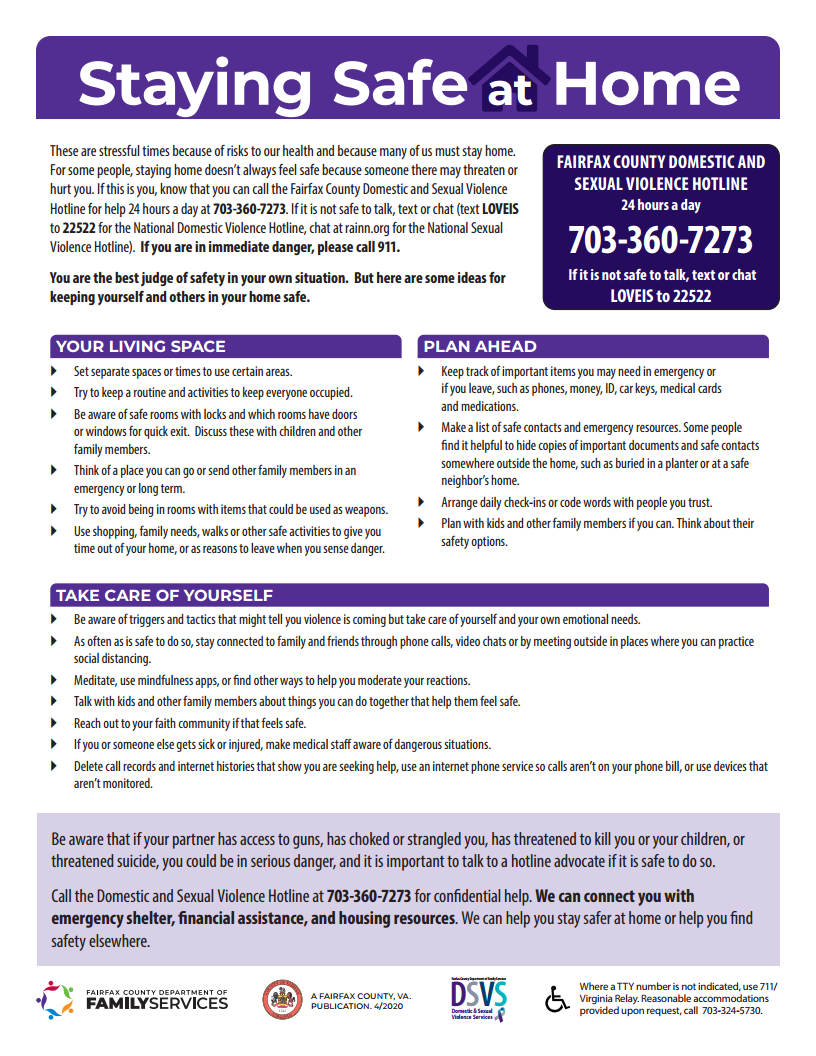(Posted 2020 March)
These are stressful times because of risks to our health and because many of us must stay home. For some people, staying home doesn’t always feel safe because someone there may threaten or hurt you. If this is you, know that you can call the Fairfax County Domestic and Sexual Violence hotline for help 24 hours a day at 703-360-7273. If it is not safe to talk, text LOVEIS to 22522 for the national domestic violence hotline or chat at rainn.org for the national sexual violence hotline. If you are in immediate danger, please call 911.
You are the best judge of safety in your own situation. But here are some ideas for keeping yourself and others in your home safe.
 Set separate spaces or times to use certain areas.
Set separate spaces or times to use certain areas. - Try to keep a routine and activities to keep everyone occupied.
- Be aware of safe rooms with locks and which rooms have doors or windows for quick exit. Discuss these with children and other family members.
- Think of a place you can go or send other family members in an emergency or long term.
- Try to avoid being in rooms with items that could be used as weapons.
- Use shopping, family needs, walks or other safe activities to give you time out of your home, or as reasons to leave when you sense danger.
 Keep track of important items you may need in emergency or if you leave, such as phones, money, ID, car keys, medical cards and medications.
Keep track of important items you may need in emergency or if you leave, such as phones, money, ID, car keys, medical cards and medications.- Make a list of safe contacts and emergency resources. Some people find it helpful to hide copies of important documents and safe contacts somewhere outside the home, such as buried in a planter or at a safe neighbor’s home.
- Arrange daily check-ins or code words with people you trust.
- Plan with kids and other family members if you can. Think about their safety options.
 Be aware of triggers and tactics that might signal violence is coming, but take care of yourself and your own emotional needs.
Be aware of triggers and tactics that might signal violence is coming, but take care of yourself and your own emotional needs.- As often as is safe to do so, stay connected to family and friends through phone calls, video chats or by meeting outside in places where you can practice social distancing.
- Meditate, use mindfulness apps, or find other ways to help you moderate your reactions.
- Talk with kids and other family members about things you can do together that help them feel safe.
- Reach out to your faith community if that feels safe.
- If you or someone else gets sick or injured, make medical staff aware of dangerous situations.
- Delete call records and internet histories that show you are seeking help, use an internet phone service so calls aren’t on your phone bill, or use devices that aren’t monitored.
Be aware that if your partner has access to guns, has choked or strangled you, has threatened to kill you or your children, or threatened suicide, you could be in serious danger, and it is important to talk to a hotline advocate if it is safe to do so.
 Call the Domestic and Sexual Violence hotline at 703-360-7273 for confidential help. We can connect you with emergency shelter, financial assistance, and housing resources. We can help you stay safer at home or help you find safety elsewhere.
Call the Domestic and Sexual Violence hotline at 703-360-7273 for confidential help. We can connect you with emergency shelter, financial assistance, and housing resources. We can help you stay safer at home or help you find safety elsewhere.
Download a flyer with this information in Arabic*, English*, Farsi*, Korean*, Spanish* or Vietnamese*.
* Fairfax County is committed to nondiscrimination on the basis of disability in all county programs, services and activities. To request reasonable accommodations or to receive this information in an alternate format, call 703-324-5730; TTY 711.
Learn more about the Department of Family Services’ Domestic and Sexual Violence Services.
This posting is part of the Department of Family Services' Community Corner where you’ll find timely information about upcoming events, parenting and wellness tips, programs and services, and more! Share these helpful posts with your friends and family. Don't miss out on future postings; sign-up today!

